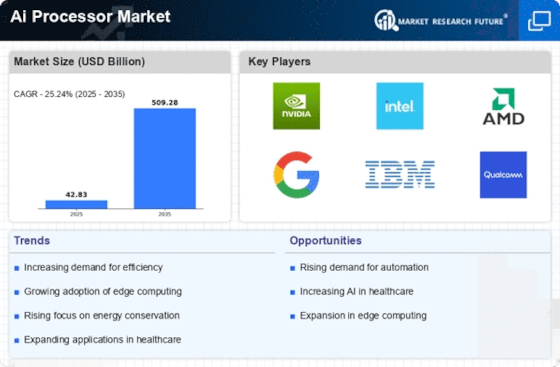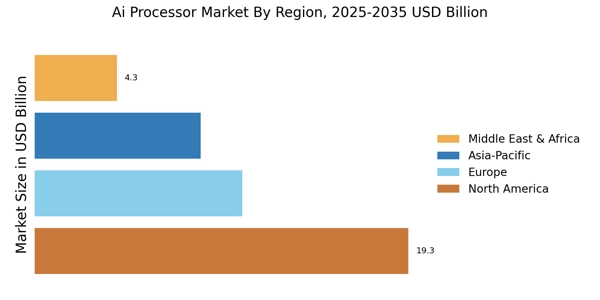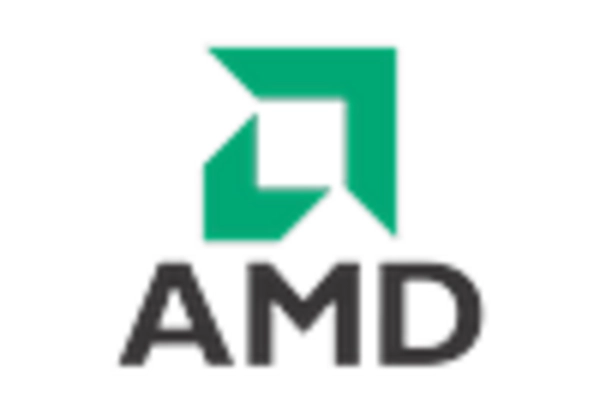Rising Demand for AI Applications
The Ai Processor Market is experiencing a notable surge in demand driven by the increasing integration of artificial intelligence across various sectors. Industries such as healthcare, finance, and automotive are leveraging AI technologies to enhance operational efficiency and decision-making processes. According to recent data, the AI applications market is projected to reach a valuation of over 500 billion dollars by 2025, indicating a robust growth trajectory. This rising demand for AI applications necessitates advanced processing capabilities, thereby propelling the growth of the Ai Processor Market. As organizations seek to harness the power of AI, the need for specialized processors that can handle complex algorithms and large datasets becomes paramount, further stimulating market expansion.
Expansion of Cloud Computing Services
The expansion of cloud computing services is a pivotal factor influencing the Ai Processor Market. As more organizations migrate to cloud-based solutions, the demand for powerful AI processors that can efficiently manage and analyze vast amounts of data in the cloud is increasing. Cloud service providers are investing heavily in AI capabilities to enhance their offerings, which in turn drives the need for specialized processors. The cloud computing market is projected to reach a valuation of over 800 billion dollars by 2025, indicating a robust growth trajectory. This expansion is likely to create new opportunities for the Ai Processor Market, as companies seek to leverage AI technologies to improve service delivery and operational efficiency.
Growing Need for Real-Time Data Processing
The demand for real-time data processing is becoming increasingly critical in the Ai Processor Market. As businesses strive to make timely decisions based on data insights, the need for processors capable of handling real-time analytics is paramount. Industries such as finance, telecommunications, and e-commerce are particularly reliant on real-time data to optimize operations and improve customer experiences. The market for real-time data processing is anticipated to grow significantly, with projections indicating a potential market size of over 20 billion dollars by 2025. This growing need for immediate data processing capabilities is likely to drive the development and adoption of advanced AI processors, thereby enhancing the overall performance of the Ai Processor Market.
Advancements in Machine Learning Algorithms
The Ai Processor Market is significantly influenced by the rapid advancements in machine learning algorithms. These innovations are enabling more sophisticated data analysis and predictive modeling, which are essential for various applications, including natural language processing and computer vision. As machine learning techniques evolve, the requirement for high-performance processors that can efficiently execute these algorithms becomes increasingly critical. The market for machine learning is expected to grow substantially, with estimates suggesting it could reach 30 billion dollars by 2025. This growth is likely to drive demand for specialized AI processors designed to optimize the performance of these advanced algorithms, thereby enhancing the overall capabilities of the Ai Processor Market.
Increased Investment in AI Research and Development
Investment in AI research and development is a key driver for the Ai Processor Market. Governments and private entities are allocating substantial resources to foster innovation in AI technologies. This influx of capital is facilitating the development of cutting-edge processors that can support complex AI workloads. For instance, recent reports indicate that global investment in AI is projected to exceed 100 billion dollars by 2025. Such financial commitment not only accelerates technological advancements but also creates a competitive landscape where companies strive to develop more efficient and powerful AI processors. Consequently, this trend is likely to bolster the growth of the Ai Processor Market as new players enter the market and existing companies enhance their product offerings.

















